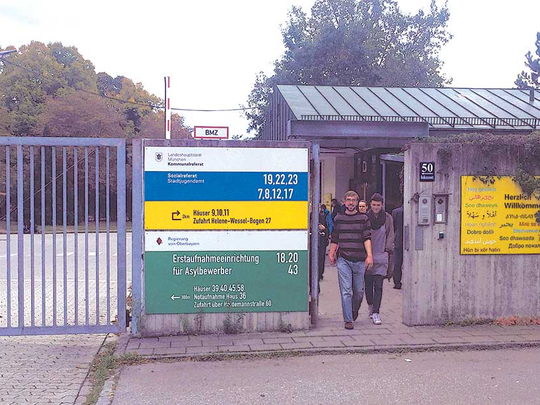
Munich: Dr Mathias Wendenborn’s plush paediatric clinic in an upscale area of Munich is bustling with patients at midday.
But a few kilometres away at Bayernkaserne, the biggest refugee camp in the city, is where this 56 year old paediatrician has found his calling.
Refudocs, the voluntary organisation of medical practitioners Wendenborn has established, runs an on-call medical facility for refugees from this former army barracks that currently houses over 1600 refugees.
“Getting medical care is the right of every refugee who is in Germany. They do not have to beg for it. After visiting the camp for the first time, I felt it is our obligation to make sure they have access to basic health care,” Wendenborn told Gulf News.
He said when the refugee influx into Germany began, the local government chose to turn a blind eye and pretend the problem did not exist. He said there was hardly any health care system in place for refugees, and the existing set up was crumbling in the face of mounting pressure.
“The government was apathetic. Not the people,” said Wendenborn. “Bureaucrats were looking for excuses to say ‘no’ when I came up with this proposal for a refugee medical practice. But I was not willing to give up.”
He said Refudocs was born when he saw the pressing need for refugee health care and found the willingness to help among many of his colleagues.
Today this voluntary squad of medical practitioners consists of around 70 doctors — including retirees and fresh graduates — who do shifts paid by government, at the refugee camp. At any given time, there is an internal medicine specialist, gynecologist, paediatrician and psychiatrist on duty.
The clinic they operate from the Bayernkasarne has all the basic facilities in place including an ultrasound scan, separate consultation rooms made of potacabins for doctors on duty, a reception, a waiting room and even a store room that has stacks of medicines, sanitary napkins, baby nappies, milk formulas and even condoms.
“When we started, it was a shanty two-room with not even basic things. We had to begin working on conditions in which we had never worked before. We had to give patients medicines from our own bags,” Wendenborn said.
Today, Refudocs treats about 100 patients a day at their centre. That sometimes includes patients with skin infections, untreated wounds, bullet injuries and feet blisters from the long treks they had undertaken.
Patients seeking psychiatric help due to psychological trauma are also common at the clinic.
Udo Schillmoeller, 75, one of Wendenborn’s colleagues and a retired doctor said viral infections, diarrhoea and flu are very common among refugee children.
“It is important that they get timely medical attention. That is why I am happy to take time off my retired life and use it for a good cause,” said Schillmoeller.
Wendenborn said the free medical service offered by Refudocs has become a successful management story that can be replicated elsewhere.
“More importantly, the goodwill and humanitarian spirit behind the venture is important as it upholds Germany’s ‘Willkommen’ [welcome] spirit.”












